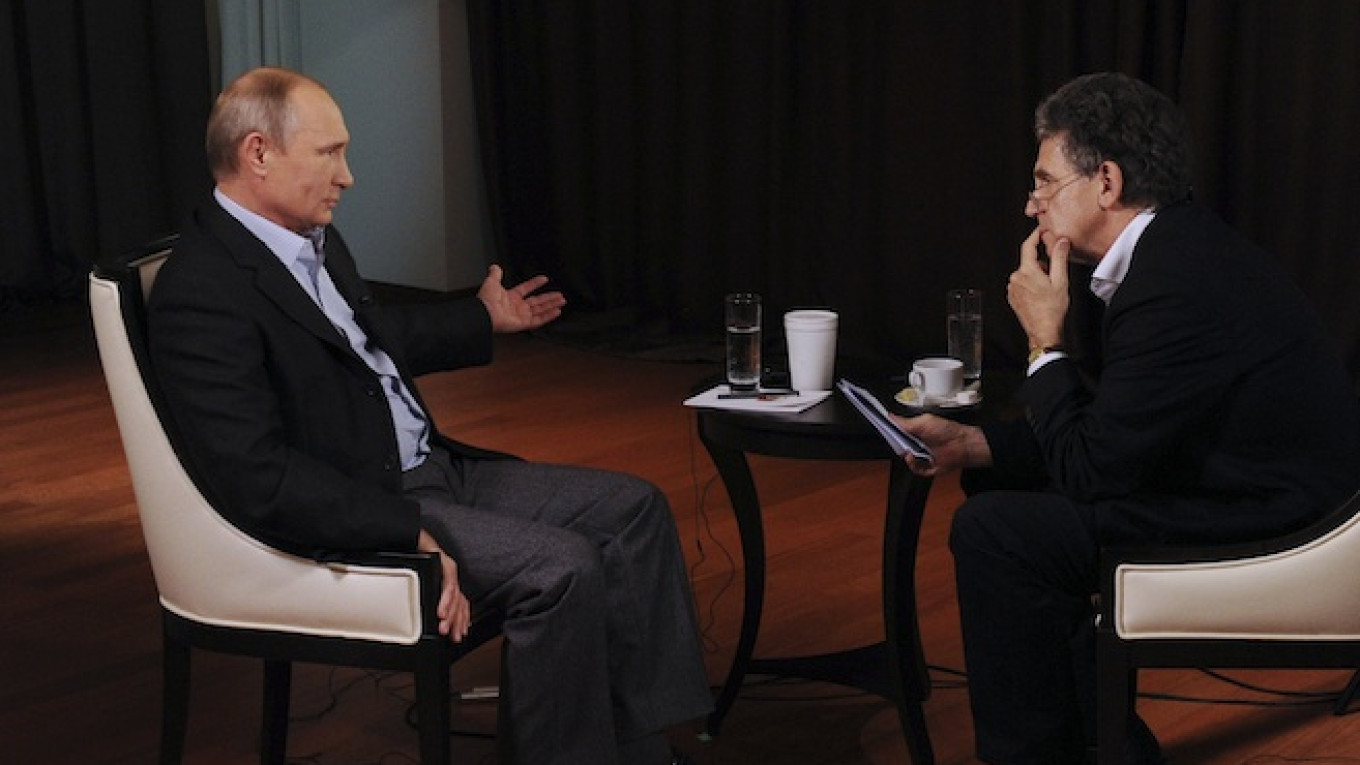BERLIN — Russian President Vladimir Putin has said in a German television interview that he is convinced it should be possible to find a way to resolve the crisis in Ukraine but added he was concerned about the threat of ethnic cleansing.
In the 30-minute landmark interview broadcast Sunday to a prime time audience, Putin defended Russia's annexation of the Crimea but also appealed to the hearts and minds of German viewers by saying relations between the two nations had never been better and saying it would be a shame to throw that away.
"Can one find a way out of this situation? Yes, I'm convinced there is a way," Putin said after criticizing the Ukraine government for using force, rather than dialogue, against its adversaries in the east to trigger the crisis.
"I'll say this bluntly: We're very concerned that the desire could arise to use ethnic cleansing. We're afraid about a drift towards neo-Nazism. There are people with swastikas on their sleeves running around and armed forces with SS symbols on the helmets … That's why we fear there's a drift in that direction. It would be a disaster for the people in Ukraine."
Despite Putin's concerns, ultranationalist groups fared dismally in Ukraine's presidential election this May, with far right candidates Dmytro Yarosh of the Right Sector and Oleh Tyahnybok of Svoboda only polling 0.7 percent and 1.16 percent of the vote, respectively. Both parties failed to pass the 5 percent threshold necessary to scrape into the legislature in October's parliamentary elections, according to data from Ukraine's electoral commission.
A conference of Ukraine's Jewish organizations, whose Russian-speaking members have been cast by the Kremlin as a primary target of the supposed rise of neo-Nazism in Ukraine, also denounced Moscow's claims earlier this month.
"We are extremely outraged by the unbridled Russian propaganda about the supposed free rein of fascism and anti-Semitism in Ukraine," Iosif Zisels, the head of Ukraine's Association of Jewish Organizations, told the conference last week, Delo.ua news site reported.
"I don't see what I hear," Zisels added.
Putin, who was once a KGB spy in Communist East Germany and speaks German fluently, was wearing a checkered dress shirt, dark jacket and grey trousers during his interview, which German network ARD said was conducted in Vladivostok on Thursday.
Putin, who spoke almost entirely in Russian and said he had made mistakes, believes Ukraine has a bright future, although it needs a framework so that all its minorities feel at home.
"It's a great nation with great people," he said. "But, you know, there's just one thing missing: an understanding that to be successful, stable and grow, everyone needs to have a feeling that this is their home no matter what language they speak — whether it's Hungarian, Russian, Ukrainian or Polish."
Putin said the annexation of Crimea was legitimate under international law and democratic because both the regional parliament and the people voted for it in a referendum. He said Russian troops were deployed to prevent bloodshed and added he was surprised by the reaction in the West.
"We consider the reaction to be completely inappropriate to what happened," said Putin, who appeared to be perspiring at times — as was the German interviewer — under the glare of the television lights. "I'm firmly convinced Russia did not violate international law in any way."
Putin, whose position has many supporters in the formerly communist eastern region of Germany, said he and Chancellor Angela Merkel were both working to calm the situation in Ukraine.
"It's in our interests … and we'll look for a common solution and a common political framework," he said. "We're ready for that but it will only work jointly."
He was asked if he had made any mistakes.
"Listen, mistakes are always made — in business and private life," he said. "Everyone makes mistakes. But what's important is to react in a timely way, analyst and understand it was a mistake and then change the behavior — and not get stuck on a dead-end street but work towards finding a solution."
Putin was full of praise for German-Russian relations. Industry leaders in Germany have been the strongest opponents of the European Union's economic sanctions against Russia.
"If you look at the atmosphere between Russia and Germany over the last 10 or 15 years, I don't know if there's ever been such a good period before. I don't think so. I think it's a very good foundation for developing not only bilateral relations but between Russia and the European Union and beyond that for global relationships. It'd be a shame to lose all that."
Material from The Moscow Times was included in this report.
A Message from The Moscow Times:
Dear readers,
We are facing unprecedented challenges. Russia's Prosecutor General's Office has designated The Moscow Times as an "undesirable" organization, criminalizing our work and putting our staff at risk of prosecution. This follows our earlier unjust labeling as a "foreign agent."
These actions are direct attempts to silence independent journalism in Russia. The authorities claim our work "discredits the decisions of the Russian leadership." We see things differently: we strive to provide accurate, unbiased reporting on Russia.
We, the journalists of The Moscow Times, refuse to be silenced. But to continue our work, we need your help.
Your support, no matter how small, makes a world of difference. If you can, please support us monthly starting from just $2. It's quick to set up, and every contribution makes a significant impact.
By supporting The Moscow Times, you're defending open, independent journalism in the face of repression. Thank you for standing with us.
Remind me later.


